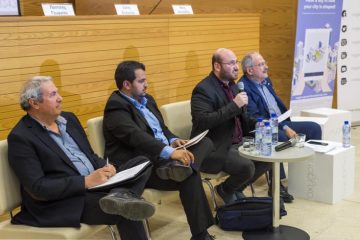SUGAR team researcher, Andreas Tsestos, attended a public consultation meeting that took place in Limassol Town Hall on the evening of Wednesday 24th July 2019. The public consultation, organized by the Limassol Municipality was regarding the future use of a large plot in Enaerios. In what has been an overwhelming attendance, the people gathered strongly expressed their opposition against the plans of Limassol Municipality for the conversion of the plot into a large-scale building development consisting of residential units, offices, hotel, retail, restaurants, conference centers, parking, and a public square.
The presentation, prepared by Deloitte-Cyprus on behalf of the Municipality, consisted of a preliminary financial appraisal presenting the project in a diagrammatic form and exploring various streams of revenue that could benefit the Municipality in the future if the project is to be realized. There were no visual proposals that could demonstrate a sense of scale and massing, an architectural language and a potential impact on the immediate context. The inclusion of such proposals might have established the foundations of a constructive dialogue between the Council and citizens present. The absence of visual data in regards to the built environment and the focus on commercial exploitation focused the conversation in finance rather than planning.
The public present directed its attention in blaming the municipality of endorsing financial interests against the needs of the city and its citizens. The Mayor and the Municipal Council were also blamed for not organizing an initial public consultation before proceeding with the commissioning of the financial study and for not taking into consideration that the citizens as well as the city itself, do not need more towers and concrete blocks, but instead more high-quality parks and open public spaces for recreational activities.
Of course, in our opinion, one does not preclude the other. However, taking the citizens outside of the design and planning process and organizing consultations in the format of presentation rather than workshop increases the perceived psychological and real threats and will more likely result to opposition to any proposal, regardless of the content and/or benefits.


